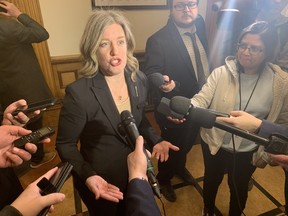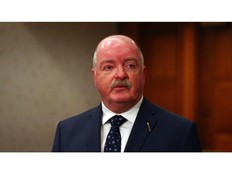Relief measures still leave too many New Brunswickers behind: critics
But Progressive Conservative finance minister plays up social assistance hikes, $200 special supplement and $300 workers' benefit

Article content
Anti-poverty activists were deeply disappointed New Brunswick’s latest budget offered little of the relief they’d sought for the province’s most vulnerable population.
Robert MacKay, the community co-chair of the New Brunswick Common Front for Social Justice, told Brunswick News on Tuesday the Progressive Conservative government wasn’t doing enough to help the poorest handle an affordability crisis.
“This was a stay-put budget and people will be just treading water, right?” he said inside the legislature shortly after listening to Finance Minister Ernie Steeves’ budget speech.
Steeves said social assistance rates would be raised 3.6 per cent in concert with inflation, but matching the rising cost of living is an annual requirement the Tory government introduced in 2021. The $7.3-million added to the welfare program will only keep people afloat, MacKay said.
We know how important it is to make ends meet.
Ernie Steeves
His nonprofit organization wanted the rates to go up much higher, to put 26,000 of the lowest-income households above the poverty line. And while MacKay said social assistance recipients appreciated the $200 per month household supplement, first announced by Social Development Minister Jill Green last November, he pointed out that it is not a permanent measure.
This can be confusing for people because they get a mixed message, MacKay said.

“People are buying cellphone plans for two or three years, counting on this money,” he said. “And landlords of rooming houses are putting rents up, based on the extra money. And this isn’t really sinking in for people, that the supplement is not locked in. It’s a temporary measure, and not permanent.”
As in years past, Common Front had called on the province to raise the minimum wage to what it calls a living wage, enough to support a family. As of April 1, it will go up to $15.30, in concert with inflation, far short of the $20 an hour the organization had demanded.
During his speech and speaking to reporters beforehand, Steeves brought up again and again the one-time $300 workers benefit. So far, more than 15,000 people who make a modest income have taken advantage of the offer, with more than 35,000 applications in before the June 30 cutoff.
“We know there are a number of working New Brunswickers and families who are feeling challenged by the higher cost of living, but haven’t been eligible for other government support programs,” the finance minister told the house. “We know how important it is to make ends meet, and this benefit should help to ease some of the financial pressures New Brunswickers are facing, along with other affordability measures we have introduced.”
We wanted to see things that would actually help people live affordably in New Brunswick, and there was nothing like that in this budget.
Susan Holt
Inflation was the highest in generations two years ago, hitting 7.3 per cent in New Brunswick, followed by another high inflation year of 3.6 per cent in 2023. The government estimates it will settle closer to two per cent by the end of this year, meeting the Bank of Canada’s inflation target, making life easier for people who are struggling with the cost of groceries or rent.
But Liberal Opposition Leader Susan Holt said most New Brunswickers still hadn’t caught up and needed more relief. She said spending $7 million so far on individual $300 cheques wouldn’t help most of New Brunswick’s 843,000 population.
“We wanted to see taxes cut on electricity bills, we wanted to see the removal of the clean fuel adjuster, we wanted to see property tax reform,” she said. “We wanted to see things that would actually help people live affordably in New Brunswick, and there was nothing like that in this budget.”











Postmedia is committed to maintaining a lively but civil forum for discussion. Please keep comments relevant and respectful. Comments may take up to an hour to appear on the site. You will receive an email if there is a reply to your comment, an update to a thread you follow or if a user you follow comments. Visit our Community Guidelines for more information.